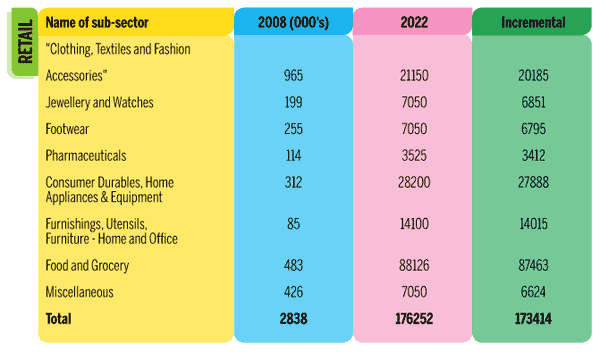Urmila Rao
From Retail to Commercial Agriculture, nearly 4.3 crores jobs would be available in the coming years, says recent research. Urmila Rao asks in this story what one should study to get one of those jobs.
The conflict between animals and humans has increased of late. Mahi Puri, an MSc, Environmental Sciences student gives an example. "Elephants seasonally migrate from Orissa to Jharkhand via Chattisgarh. But due to mining activities in Chattisgarh forests, the pachyderms directly come in contact with workers and their villages leading to fatal clashes," the 25-year-old TERI University student, who volunteered with wildlife organisations for five years, makes her point.
It takes a new breed of professionals to handle such conflicts and ensure that development happens without too much ecological devastation. Welcome to the world of Developmental Officer or Environmental Manager, a career that never existed ten years ago.
For the second consecutive year, we attempted to identify those sectors and careers that provide the maximum number of exciting opportunities in the coming year. What are the skill sets needed to enter these sectors? Where are the jobs? The results came as a revelation.
While Banking, Pharma, Retail, IT and Education remain the top sectors where most of the action happens, a whole
new range of sectors have emerged out of the blue.
The new job guzzlers are: Ethical Tourism, Design Services, Shared IT Services, Real Estate and Food Processing.
The nature of jobs too has undergone a sea change. New careers like Chief Happiness Officer, Design Analyst, Risk Evaluator, and Sustainability Expert have come into being. Each of these jobs demand skill sets which are complex and cut across disciplines. So in addition to above average understanding of the domain, ability to learn quickly, draw lessons from diverse experiences and events and apply them to situations which are totally different are some of the new skill demands placed on the executive of today.
Where are maximum job opportunities?
Every sector is likely to grow where the technology involved has undergone a basic shift, or a new model of servicing them came into being, says E. Balaji MaFoi Randstad's MD & CEO. For example, in Banking, still nearly 81 percent of the population has no access to formal banking channels.
And since their saving potential is erratic, the serving model has to be cost effective. The micro-credit revolution that swept the market recently is an example, which in its wake brought in more than 3 lakh opportunities for young graduates as lending and credit officers.
Balaji's view is shared by other experts also.
The notable aspect, however, is post-recession, almost all sectors have recorded growth (barring a few, like Real Estate) and a few made impressive gains. According to experts some sectors hold a definitive sway in the coming 3-4 years like Banking and allied verticals, Telecom and some, like the green sector, will deliver the best in the coming 5-year horizon. Defensive sectors like Pharma will clock a steady growth.
So read on to find out that one job or the sector that suits you, the reader...
NEXT: Jobs in Banking, Financial Services & Insurance Sector
Jobs in Banking, Financial Services & Insurance Sector
Image: People walk past an ATM counter of Citibank in MumbaiPhotographs: Arko Datta/Reuters
The banking industry, along with allied verticals, will have better growth than last year because of favourable borrowing climate. Apart from consumer borrowing, industries like Infrastructure are heavy on borrowing. Consent to foreign banks for opening branches is also adding to the growth. "So in the last one year, just one quarter has seen banks opening up anywhere between 20-80 branches," apprises Anand, an analyst. One branch opens up job opportunities for a minimum of 25-30 people. But even then, the fact remains that the sector still has not penetrated more than 14 percent of the eligible population.
Where are the jobs?
While financial intermediaries segment offers the maximum numbers, high-quality, high-pay jobs are in the Banking
and Insurance sector. The marketing function dominates the financial intermediaries sections; functional areas
dominate the banking sector. "This sector has been doing well for quite some time and is again going to grow because penetration of banking and insurance is still low if you see the figure on a national scale," says Shiv Agrawal of ABC Consultants.
According to him, the profiles which are going to be in demand are financial advisors and insurance sales.
What are the skills?
The premier qualification that opens the doors to this sector remains CA/CS and MBA with specialisation in
Finance. MBAs with ability to do acute risk assessment would find tremendous opportunities in the sector.
But the maximum number of opportunity lies in financial intermediary skills.
Ability to understand a product, communicate its benefits and risks well, assess the level of risk and returns are the core skills required here. "If you know how to keep the interest of the consumer in the mind, financial products sales is the most lucrative field," says Raghuraman, an independent financial advisor. But the job demands quite a bit of physical stamina, and mental alertness. In fact, when ICICI Prudential recruits its
trainees, one of the slides in the presentation says that the executives must be willing to slog it out in the initial years. "It is not a cushy job," concurs Karna Dharmapuri, a middle manager at an insurance firm. But the adrenaline rush one gets once you close a one crore insurance policy is unmatched, he gushes. "It is a challenging sector and the money is quite good," he concludes.

NEXT: Jobs in the Education sector
Jobs in the Education sector
Image: EducationPhotographs: Rediff Archives
With over 50,000 crore rupees being pumped into this sector by the government in the budget this year, it is raining jobs in Higher Education. "The allocation is 24 percent higher than of last year, a clear indicator
of the 'need gap' that exists in this sector and the growth potential it has to offer," says Khozem Merchant, President, Pearson India.
According to him the growth levels are certainly impressive and the climate in Indian education is profoundly conducive for all types of educators -- philanthropists, corporates and NGOs. And this makes education the next frontier industry, a view echoed by Praful Pillay, Vice President, Sungard, a global firm in education
Where are the jobs?
India needs trainers, better quality teachers, content developers, as well as IT professionals with product applications in education, which underlies the importance of technology in transforming learning. According to Shiv Agrawal, demand starts right from the pre-nursery level with play schools and day care creches which have increased due to the growing pattern of both parents working. Then we have the huge K-12 (kindergarten to class 12th) segment.
And with increased demand for both teachers as well as people who can manage the initiatives professionally,
salaries are also on the rise.
What are the skills?
Primarily, two kinds of qualifications are essential for entering the teaching profession. At the primary school level, teacher training diplomas after 10+2 are the valid means of entry. At the middle and secondary school levels, in addition to a basic graduate degree a degree in education (BEd) is also required. To be a successful teacher, along with in-depth domain knowledge in the chosen subject, one must also have superior communication skills, empathy and sensitivity to diverse learning needs of ones own students.

NEXT: Jobs in the Pharma sector
Jobs in the Pharma sector
Image: A health worker displays bottles of vaccine 'Pneumovax' during a vaccination programme organised by non-government organisation 'Sngobadho'Photographs: Rupak De Chowdhuri/Reuters
Human beings and ailments go together, so medicines would always be in demand, jests one of our experts when quizzed why Pharma remains an evergreen sector.
Though growth rates have peaked, the sector always has consistent demand for manpower.
Research shows that production is wherein maximum employment (50-65 percent) happens in this sector. And being a knowledge-intensive sector, over 8 percent of the total employed would have tertiary degrees.
The sector values knowledge and expertise said Dr Kiran Mazumdar Shaw, Chairman and MD of Biocon Ltd, in an interview to this magazine.
Where are the jobs?
Pharma graduates can go into production, marketing and sales, academics, quality control or assurance departments
of pharmaceutical companies like Cipla, Ranbaxy, Dr. Reddy's etc., in Neutraceutical companies like Dabur, Zandu etc, in Biotech companies like Biocon, Bharat Serum, Health Insurance companies like Bajaj Allianz, Apollo Munich etc.
With over 4.7 million professionals in demand over the next 10 years the sector is a consistent employer. Quips, Anand, there is only so much medicine that one could consume.
What are the skills?
This sector demands skills that require long drawn preparation like acquisition of degrees, and involve highly technical or commercial operations. So higher qualifications like MPharm matter a lot. "Research abilities are crucial, so is an inquisitive mind," says Kris Lakshmikant, CEO, Headhunters.
NEXT: Jobs in the Infrastructure sector
Jobs in the Infrastructure sector
Image: Labourers work at a construction site in the southern Indian city of HyderabadPhotographs: Krishnendu Halder/Reuters
The Indian growth story hinges on the Infrastructure sector. It is the feverish building of real estate, construction, roads, ports, bridges and airports that stimulates consumption and drives growth. But the commitment to develop them does not always translate into completion. While policy and politics do play a dampener, the major bottleneck is lack of trained manpower.
With over 4.4 million incremental jobs the sector guzzles manpower and according to Rajesh Bakshani, General
Manager with L & T, it is almost impossible to get trained personal both at managerial as well as workman levels.
What are the skills?
This sector demands technical and project management skills. According to Shiv Agrawal, this has given rise to the increase in demand for Civil Engineers and project management professionals. Very high energy levels, physical stamina and ability to work under trying conditions are some of the qualities essential to a good infrastructure professional.
Legality is another core issue in these sectors. Land being the prime factor, there is a perpetual demand for professionals who understand the land registry system, valuation and laws pertaining to ownership and transfer. Also in demand are human resource professionals who could recruit and manage a large work force with very high levels of difference in their educational attainments.

NEXT: Jobs in the Automobile sector
Jobs in the Automobile sector
This is a sector with tremendous spin-off effects for both employment and the economy. And a unique feature of the sector is that it is a cluster-based industry.
Where are the jobs?
The maximum number of jobs is at the shop floor. Nearly 65 percent of the total work force remains here and with the advent of MNCs into the sector average pay package has grown.
"Two verticals which are on the rise in the last two three years is design and development and industrial engineering," says Amudha Parikhar, a consultant to the industry.
With all the firms focusing on launching India-specific vehicles, development of new vehicles is on the rise, resulting in huge demand for labour.
What are the skills?
The sector demands high level of understanding of computer-controlled machinery and robotics since most of the auto assembly lines are completely automated. With concepts like Just in Time coming in, very high levels of awareness of quality concepts are also essential.
The most preferred qualification is a B.Tech in Automobiles.
NEXT: Jobs in the IT Sector
Jobs in the IT Sector
Photographs: Jo Yong-Hak/Reuters
With over two million direct jobs created in less than two decades, IT & ITES are employment bellwethers in India. From high-end consulting to the much-maligned voice-based BPOs, the sector straddles the entire spectrum of IT services.
According to Ashok Reddy, Managing Director, TeamLease Services, the sector would continue to hire in large numbers.
The employment Outlook report of TeamLease (January-March 2011) points that IT-enabled sectors will hire
in large numbers for sales, marketing, customer service and engineering roles. Global Consulting firm Deloitte's report released in March 2011 states that the Indian IT industry will add over 2.25 lakh employees in 2011.
According to the Job Index report of TeamLease, hiring initiatives are more likely to accelerate in tier II cities.
Where are the jobs?
Research by NSDC shows that the sector would treble its manpower requirement in the next 10 years to hit 7.4
million jobs, wherein the maximum recruitment would happen in the ITES sector. With more and more Indian corporations getting into the IT bandwagon, custom development of IT software and servicing for domestic firms will be on the rise. As corporations like Infosys, TCS and Wipro move up the value chain, high-end jobs are also increasing, says Shiv Agrawal.
What are the skills?
Coding skills are the most crucial. A basic degree in engineering is a primary requirement. While circuit branches like electronics, computer science and IT are most preferred for this sector, they also recruit heavily from other branches. Since IT is an enabling factor for most industries, ability to understand the business requirements of the customer is another crucial skill in this sector according to Kris. Which is one reason why firms prefer an BE and MBA combination very much, concurs Nita Barmar, CEO Eon Advisory, a recruitment firm focusing especially on high-tech sectors.

NEXT: Jobs in the Telecom sector
Jobs in the Telecom sector
Image: Stefan Wermuth/ReutersPhotographs: The British Telecom Tower in central London
In Telecom sector, service providers like Bharti Airtel and Vodafone are consolidating to cut operational costs.
On its infrastructure side, though the revenues for players are dipping due to increased teledensity, from about
25 per cent to more than 55 per cent, resulting in revenue loss per user and revenue decline per minute, expansion is providing the lifeline. "Bharti Telecom has just entered South African market and other players are expanding in rural areas," says Anand. And this translates into increased employment. "So the top line growth exists," Anand assures.
According to E Balaji, the primary cause of the exponential growth in the sector is because the underlying technology changed and the newer one was much more attractive that the older one.
In basic telephony not much growth is expected because technology has migrated to the mobile sector, he says.
Additionally, notwithstanding the recent imbroglio with respect to 2G spectrum allocation, the entry of new
players into the telecom sector like Uninor, Videocon, and the consolidation by Idea, Tata Telecom and Reliance,
opportunities at the operations is quite high in the sector. The rise in new technologies like 3G would usher in a range of new users and consequently servicing them would give rise to new employment opportunities says Nita Barmar, CEO, Eon Advisory, a recruiting firm focussing on high-tech sectors.
Another vertical which will see explosive growth is the Internet and mobile access. As penetration levels in India are barely 5-6 percent, which are miniscule as compared to 25-30 percent in any noteworthy country, including China, this sector will definitely be a storehouse of jobs in the coming years. This fact, coupled with the rising disposable incomes and steady reduction in prices, will lead to more and more people owning different gadgets and getting Internet connectivity says Oberoi.
Where are the jobs?
Marketing and customer service have the maximum number of opportunities in this sector. It is a high customer-oriented sector says Kris Lakskhmikant. With number portability coming into play, companies need
to ramp up fast their customer service teams and accordingly, there will be a fantastic rise in jobs in this domain, he asserts. Moreover, roll out operations and maintenance are also domains which will see recruitment activity, according to Barmar.
Where are the skills?
In operations, domain knowledge is the core requirement. Programmes like BTech in telecommunications, BTech
(Information Technology) and MBA (Telecom) are programmes that would easily get you a job in the sector. Customer
Management skills are also in high demand. Though ordinary graduates whose communication and interpersonal skills are above average could enter into marketing and customer service, it makes much more career sense if you have an MBA before you begin working in the sector.

NEXT: Jobs in the Retail sector
Jobs in the Retail sector
Image: People shop inside India's Bharti group and Wal-Mart's cash-and-carry joint venture store on the outskirts of the northern Indian city of AmritsarPhotographs: Munish Sharma/Reuters
Organised Retail at about 1.5 lakh crore rupees is still in its emerging stage in India and has tremendous potential for growth and employment. Since FDI is not allowed till now in this sector the industry has not taken off in the real sense, and jobs would boom once that is allowed, concurs Shiv Agrawal. The sector has seen many ups and downs, alternating between major hiring up to 2008 and lay offs in 2009 and it has stabilised again, and with norms of investment easing, it would grow by leaps and bounds in the coming years.
From clothing and textiles to food and groceries organised retail today is valued at over 1 lakh crore rupees and is still estimated to account for just about 5 percent of the total retail sector. So growth possibilities are tremendous.
Where are the jobs?
According to Shiv Agrawal, jobs are available both at the front end and the back end. The front end jobs would
involve interacting with and servicing the customer and was traditionally considered not a good career option. But with possibilities of further progression available that is changing and moreover 4.4 million new jobs are expected to be created in this segment. Back end operations in terms of stocking, purchase and management of supply chain is another burgeoning field and would be hiring in large numbers in the coming years. A recent survey reports about 1.2 lakh jobs in this sector every year for the next 10 years.
What are the skills?
Neeraj, a Floor Manager at Pantaloon, is clear that it is all about attitude. "One needs to have a feel for the customer. While strong technical skills in terms of function domains are required for back end. An MBA in Logistics or diploma in materials management are crucial qualifications for back end job," says Neeraj. Any graduation with good communication skills is essential for front end jobs though even 10+2 passouts with drive and ambition would fit the bill equally. "But what is essential is a smiling face with attention to detail, the ability to keep the big and small picture simultaneously," concludes Neeraj.

NEXT: Jobs in the Emerging sectors
Jobs in the Emerging Sectors
Image: A farmer works inside a sugarcane field at Moynaguri village, about 66 km north of the eastern Indian city of SiliguriPhotographs: Rupak De Chowdhuri/Reuters
From design services to development, these 10 verticals do not employ too many people currently, but they have tremendous potential in the coming years. Take for example the energy sector.
With the per capita power consumption expected to double in the coming decade, new and alternative forms of energy production would lead to a demand for a whole host of professionals from engineers to ecologists, comments Hitesh.
Or for that matter, KPOs. With voicebased BPOs rapidly losing the competitive advantage to other offshore locations such as the Philippines, and with a steady supply of qualified professionals, KPOs/LPOs (Legal Process Outsourcing) appear to grow at a substantial clip, says Barmar.
At times even change in consumer preferences could open up new job avenues. Commercial agriculture is one such example.

Comments Prof. Dr. T Janakiram, faculty at Indian Agricultural Research Institute, New Delhi, "Thanks to western influence events like Valentine's Day, Friendship Day, Mother and Father's Day are celebrated
here as well, and none is incomplete without flowers.
On many occasions, the traditional exchange of sweets is being replaced or supplemented with flowers.
This has resulted in an exponential rise in demand for cut flowers thereby opening up a new career avenue for students of agriculture.
The explosion of television channels is another domain where demand for good professionals has perked up. While
journalists are on a high, technical skills like video editing, camera and production skills are also in demand.
What are the skills?
While specialised verticals like design and agriculture demand experts with professional qualifications in that
domain, sectors like development, KPO, media are excellent avenues for good graduates to make their entry.
Even though professional qualifications like MSW in case of Development or Journalism degrees in terms of Media do exist, any good graduate with substantial verve and drive could easily get a job in the sector, says E Balaji. And for Mahi Puri it is commitment that matters.











Comment
article